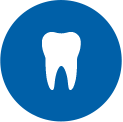 Dry mouth, or xerostomia, results from intense or prolonged stress, cancer treatment, immune system deficiencies and other factors. More than just a nuisance, dry mouth contributes to worrisome dental issues, such as cavities. Learn more about xerostomia and how to deal with it from your Whiting dentists, Dr. Daniel Jordan Berquist and Dr. Robert Jordan Berquist, at Berquist Family Dentistry.
Dry mouth, or xerostomia, results from intense or prolonged stress, cancer treatment, immune system deficiencies and other factors. More than just a nuisance, dry mouth contributes to worrisome dental issues, such as cavities. Learn more about xerostomia and how to deal with it from your Whiting dentists, Dr. Daniel Jordan Berquist and Dr. Robert Jordan Berquist, at Berquist Family Dentistry.
Is Xerostomia Harmful?
Yes, chronic dry mouth is harmful if it’s persistent, leaving the oral tissues feeling sticky and irritated. Adequate saliva is important; it moisturizes the inside of the mouth and the esophagus, starting digestion with an enzyme called amylase. The body naturally produces this chemical to break down the carbohydrates and sugars we consume. Without amylase, the esophagus and stomach are hard-pressed to digest foods.
Lacking saliva, your mouth can’t taste, talk, chew and swallow normally. In fact, the drier the mouth becomes, the more problems oral tissues develop. Saliva is a wonderful antimicrobial agent and protects the mouth from viral and bacterial infections such as the common cold sore.
How Xerostomia Occurs
Doctors at Mayo Clinic say that dry mouth happens more often as we age. Women over 40 seem very prone, and about 20 percent of seniors have dry mouth. Other factors such as anxiety and chronic stress, plus just not drinking enough water, factor into the condition. Excessive caffeine and alcohol consumption, very spicy foods and too much salt dry out oral mucosa.
Some prescription medications cause xerostomia. Cancer drugs, high blood pressure medications, muscle relaxants and diuretics (water pills) remove moisture from the lips, tongue and gums. If you think one of your prescription medications is problematic, ask your physician or pharmacist. There may be an alternative medication you could use.
Serious health conditions which precipitate dry mouth include:
- Head and neck injuries
- Cirrhosis of the liver
- Diabetes
- Arthritis
- Cystic fibrosis
- HIV
- Parkinson’s Disease
- Autoimmune disorders, such as Sjogren’s Syndrome, which disrupts tear glands and salivary glands
Helping Dry Mouth
Dr. Berquist can diagnose dry mouth. He might recommend a simple intervention such as adequate water intake and chewing sugarless gum to stimulate the salivary glands. Limiting caffeinated beverages, such as coffee, tea and colas, along with reducing alcohol and salt, helps. Smoking cessation reduces symptoms, and of course, it benefits overall health, too.
Some people use a humidifier to moisturize the air, particularly at night. Others make a conscious effort to breathe through the nose. Denture wearers should remove their appliances at night. Over-the-counter dry mouth rinses and saliva stimulants and substitutes relieve uncomfortable symptoms.
Is Your Mouth Dry?
Keep up your 6-month check-ups and professional cleanings at Berquist Family Dentistry . Brush with a soft-bristled brush twice a day, and floss once a day. Select a quality fluoride toothpaste. Diligent at-home oral hygiene stimulates salivary glands to keep saliva flowing, digestion on track and your mouth moisturized and comfortable.
Contact Berquist Family Dentistry for your routine appointment. Ask your dentist about dry mouth and what you can do to control it.








